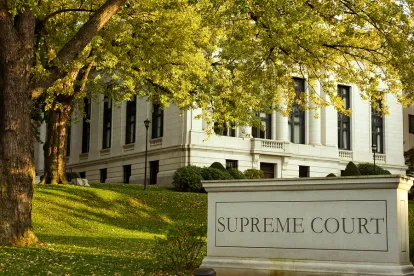The U.S. Supreme Court in 2021 issued a significant decision on Article III standing in the context of a class action brought under the Fair Credit Reporting Act (FCRA). The Court also granted certiorari in cases that will have important implications for employers’ right to pursue arbitration (in lieu of costly litigation).
“No concrete harm, no standing”
In recent years, many employment class actions have been premised on technical statutory violations. Examples include actions alleging defective FCRA notices issued when conducting pre-employment background checks, defective COBRA election notices, and violations of state privacy laws. A Supreme Court decision issued this summer may allow employers defending such actions to show that some or all of the employees alleging these mere technical violations have not suffered any concrete harm and, therefore, their claims should be dismissed.
Significantly, the Supreme Court declined to address “[w]hether either Article III or Rule 23 permits a damages class action where the vast majority of the class suffered no actual injury, let alone an injury anything like what the class representative suffered.”
In a divided 5-4 opinion addressing the right of consumers to sue a credit reporting agency for technical violations of the FCRA, the Supreme Court ruled, “Article III standing requires a concrete injury even in the context of a statutory violation.” Thus, only those individuals whose inaccurate credit files were released to third parties had the requisite standing to seek damages under the FCRA since they suffered a concrete reputational injury. The remaining class members, whose inaccurate credit reports were not disseminated to third parties, did not suffer cognizable harm, and therefore, lacked standing to sue.
Writing for the majority, Justice Brett M. Kavanaugh concluded, “The mere presence of an inaccuracy in an internal credit file, if it is not disclosed to a third party, causes no concrete harm.” Insofar as the plaintiffs whose credit files had not been disseminated argued that the inaccurate and defamatory alerts on their credit reports might yet be released to a third party, the Court majority suggested the proper approach to such alleged future harms would be to cross that injury bridge when they get to it. Justice Kavanaugh also addressed the plaintiffs’ assertion that the forms of the disclosures they received were not compliant (a claim many employers face in expensive and burdensome class actions), ruling they failed to demonstrate the alleged deficiencies “caused them a harm with a close relationship to a harm traditionally recognized as providing a basis for a lawsuit in American Courts.”
Significantly, the Supreme Court declined to address “[w]hether either Article III or Rule 23 permits a damages class action where the vast majority of the class suffered no actual injury, let alone an injury anything like what the class representative suffered.” While the majority opinion ruled that every class member must show standing to recover individual damages in federal court, it did not address the question of whether Article III standing was required at the class certification stage.
FAA transportation worker exemption
In December, the Supreme Court granted certiorari to resolve whether the FAA’s transportation worker exemption for classes of workers engaged in foreign or interstate commerce applies to an airline’s ramp workers operating out of Chicago’s Midway Airport. The Court will consider “[w]hether workers who load or unload goods from vehicles that travel in interstate commerce, but do not physically transport such goods themselves, are interstate ‘transportation workers’ exempt from the Federal Arbitration Act.” The Court’s holding will determine whether the workers will be able to pursue their overtime collective action in federal court or, rather, must arbitrate their claims on an individual basis pursuant to an arbitration agreement with their employer.
The Supreme Court previously had rejected two separate petitions for certiorari filed by an online retailer asking the justices to weigh in on the hotly contested issue whether gig drivers can be forced to arbitrate independent contractor misclassification claims. The question at hand was whether the transportation worker exemption applies to “last mile” delivery drivers who do not cross state lines in the course of making deliveries of out-of-state goods. The Supreme Court’s decision not to take up the petitions had left a circuit split in place.
In recent years, the transportation worker exemption has emerged as one of the most significant issues in class action litigation, particularly as employers increasingly have adopted arbitration agreements with class and collective action waivers in an effort to rein in litigation costs and as wage and hour lawsuits have proliferated among employees and independent contractors who claim to fall within the exemption.
Litigation as arbitration waiver
The Supreme Court also will determine whether a plaintiff should be required to show prejudice when arguing that a defendant waived its right to arbitrate (pursuant to an arbitration agreement between the parties) by engaging in conduct that indicates an intent to litigate.
In the case below, a district court denied an employer’s motion to compel a fast-food worker to arbitrate her FLSA overtime claims, finding the employer waived the right to compel arbitration by waiting eight months to do so. A divided Eighth Circuit reversed. The panel majority pointed out that four of those eight months were not spent actively litigating but waiting for the court to rule on the defendant’s motion to dismiss. Moreover, the majority said, instead of focusing on the employer’s delay in asserting its right to arbitrate, the lower court should have considered the nature of the motion to dismiss: The employer’s motion focused on the “first-to-file” rule, so the parties spent no time litigating the merits of the case. Because no discovery was conducted, and there was no evidence the employee would have to duplicate her efforts during arbitration, the appeals court found the employee was not prejudiced by the employer’s litigation strategy.
In reaching its determination, the Eighth Circuit joined eight other federal courts of appeals and most state supreme courts in requiring the party asserting waiver to show the waiving party’s inconsistent acts caused prejudice. However, in her petition for certiorari, the employee argued that these courts have erred in grafting an additional requirement onto the waiver analysis when the contract at issue happens to involve arbitration. Ordinary contract principles have devolved into a “muddled mess” in the context of arbitration, the employee asserts. The petition notes that three other federal courts of appeal, and the supreme courts of at least four states, do not include prejudice as an essential element of proving waiver of the right to arbitrate. It further asserts the arbitration-specific requirement that the proponent of a contractual waiver defense must prove prejudice violates the Court’s ruling in AT&T Mobility LLC v. Concepcion: that lower courts must “place arbitration agreements on an equal footing with other contracts.”






 />i
/>i
